Monaco owes a great deal to Claude Gauthier, who was in charge of the Principality’s security for decades. Through his paintings he is also an ambassador of Monaco’s beauty and life.
“In a pictorial style that is all his own, Claude Gauthier takes us on a voyage of discovery, into a world that he observes with the acuity of an entomologist, then draws and colours with the sensitivity of a poet,” wrote Prince Rainier III in a preface to the book Rencontre avec Gauthier by Anne Devroye-Stilz.
Advertising
With vivid, shimmering colours, the canvases are bound to catch the eye, and then the viewer is drawn in by the teeming detail in his paintings. Considered a painter of naïve art, Claude Gauthier prefers to describe his work in these terms: “It’s not naïve, let’s say I get as close to nature as possible because I find nature to be an incredible bounty.”
At their home, Claude Gauthier and his wife Josette showed us the studio where the magic happens. Which is something akin to a cabinet of curiosities. Dozens of sketchbooks and mementos amassed over the years sit side by side on the shelves, while the walls are covered with canvases and photos of key moments in their lives. The Princely family has a prominent place here, adding a touch of prestige to the already enchanting setting.
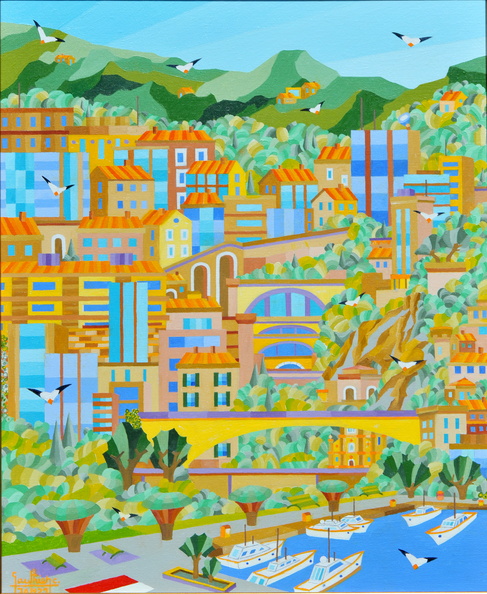
Claude Gauthier paints not just for himself, but also to pass on his love of nature and Monegasque life. “He’s so generous! He takes a back seat to make room for other people,” Josette tells us when Claude steps out for a moment. His painting reflects that generosity, as does his everyday behaviour. Always attentive, he shares his take on the world, his art and his know-how with enthusiasm. Something he aims to pass on.
The unusual life of a painting policeman
Born in 1939 in Neuilly-sur-Seine, just outside Paris, Claude Gauthier won a painting prize at the age of six. His teachers quickly noticed his talent. Having won a scholarship, he went to building school, less than ten years after the end of the Second World War which had a profound effect on him.
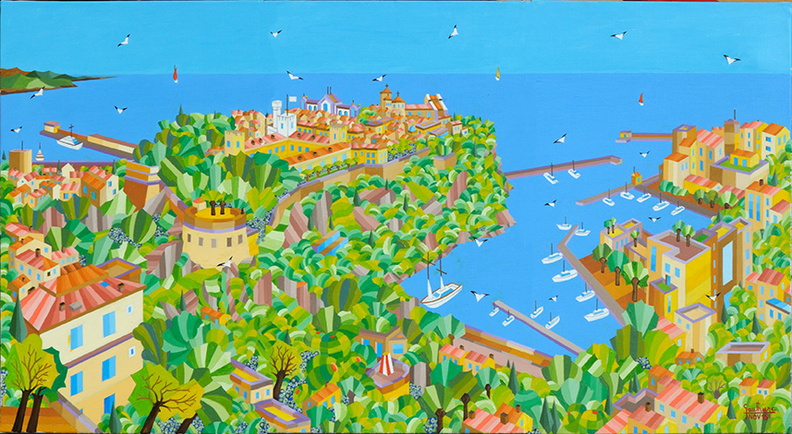
However, he didn’t take up painting full-time until later on, starting out instead by restoring ceilings in Beausoleil’s finest homes. After his military service, he became a children’s camp counsellor in 1962. That’s where he met Josette, his wife of 62 years.
After sitting two entrance examinations, one for the SNCF and the other for the Sûreté Publique, Monaco’s Police Department, Claude Gauthier finally chose to pursue a career in Monaco in 1964. He didn’t give up painting though. Every morning, the painting policeman would get up at 5 o’clock to paint before going to work. Self-taught, he developed his own style, experimenting and using colours in a unique way.
Passion and perseverance
His work gradually caught the attention of art critics, in particular Anne Still Devroye, curator of the Musée International d’Art Naïf Anatole Javkovsky, who said in 1986: “His style is uncompromising, unfiltered by the vagaries of impressionist light, it is as sharp and versatile as a chessboard.”
However, his. notoriety went off the charts when in 1971 Princess Grace chose one of his paintings, depicting the Principality at night, as part of a group exhibition. A personal visit by the Princess to one of his exhibitions cemented his success. It was at this point that his exhibitions really began to grow, including internationally, strengthening his ties with the Princely Family. “The Prince comes to almost all my exhibitions,” Claude says proudly.
A dreamlike reality
Claude Gauthier finds inspiration everywhere: the pattern in a rug, nature in his surroundings, or on his travels. Every detail is recorded in his sketchbooks, then brought to life in his large-scale paintings.
His paintings are imbued with gentle nostalgia, taking us into a dreamlike universe where reality and imagination are intertwined. His paintings depict a reality all his own, a kind of grand fresco where each detail contributes to the whole. His paintings seem to encapsulate all that is exceptional in the place.
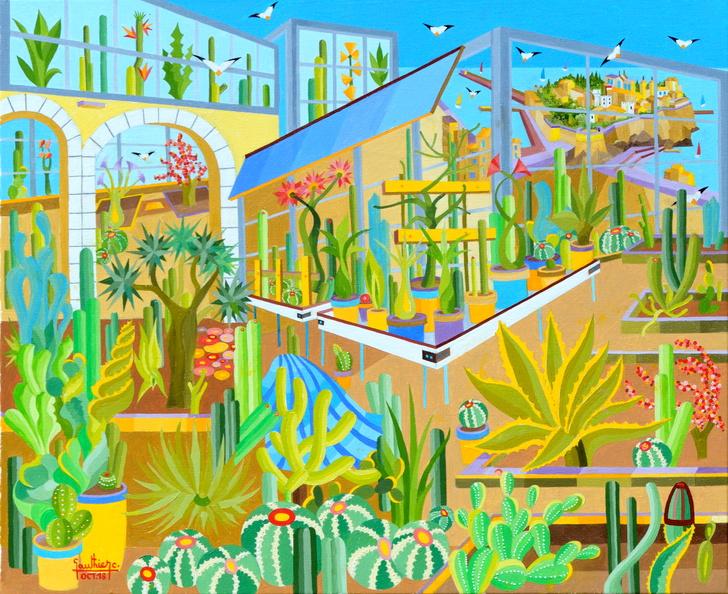
While his entourage inspires him, Claude Gauthier, as a self-taught artist, honed his craft by studying other painters. “I read a lot about painters to broaden my horizons because it makes me imagine things, break things down and see colours,” he says. But if Claude had to pick just one painting that inspired him enormously it would be Dali’s Tuna Fishing.
Teamwork
Working hand in hand, Josette and Claude Gauthier make a great team. While Claude focuses on his art, Josette takes care of the administrative side of things and has a “supervisory role,” as she jokingly puts it.
In fact, his cheerful, rich colours are a good reflection of the couple’s mindset. Quiet but jovial, they both enjoy life to the full and at every opportunity, finding a happy slice wherever they can, which Claude then manages to portray in his paintings.
A prolific body of work
Today, at 85, Claude Gauthier continues to paint daily, practically from dawn to dusk. In recent years, the artist has painted many of the Grimaldi Historical Sites. Over the past two years, he has produced around sixty paintings representing the towns and territories that have ties to the Principality.
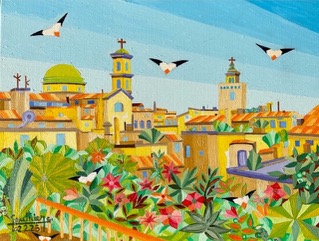
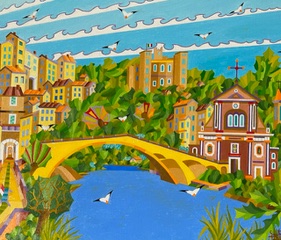
His works are not only on canvas. They are also on postcards, stamps in honour of Monaco, and they illustrate many books, including the recent Rosie et Wally à Monaco by the Belgian-Monegasque author Margaretta Crovetto Heylen, which tells the story of a sick little girl who visits Monaco. A collection of Italian poems is also on the way.
In addition to his artistic career, Claude Gauthier is very involved in Monegasque life. Honorary Vice-President of the International Association of Visual Arts at UNESCO, founding member of the International Police Association – Monaco section and also founding member of the Goûts et Saveurs (Tastes and Flavours) non-profit, he is actively involved in raising children’s awareness about the importance of eating well. Something else to pass on, as he loves to do.


